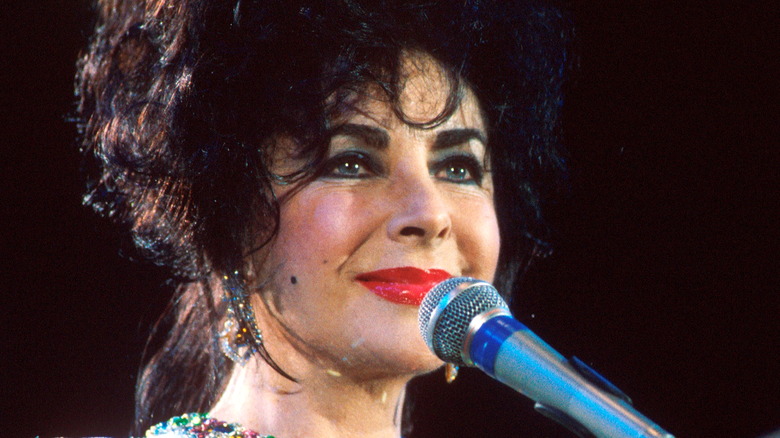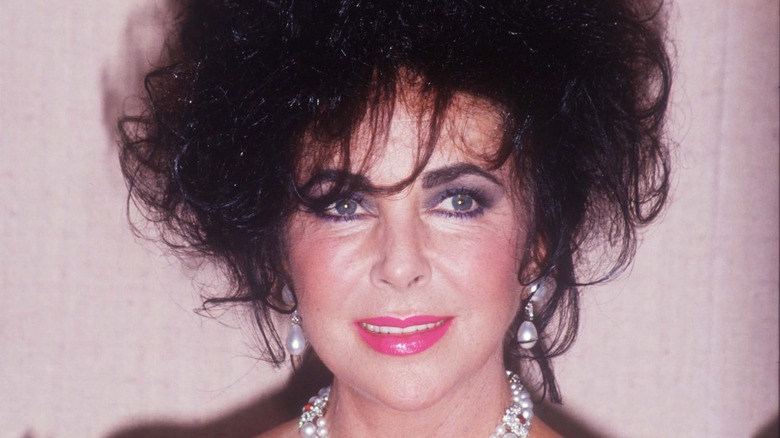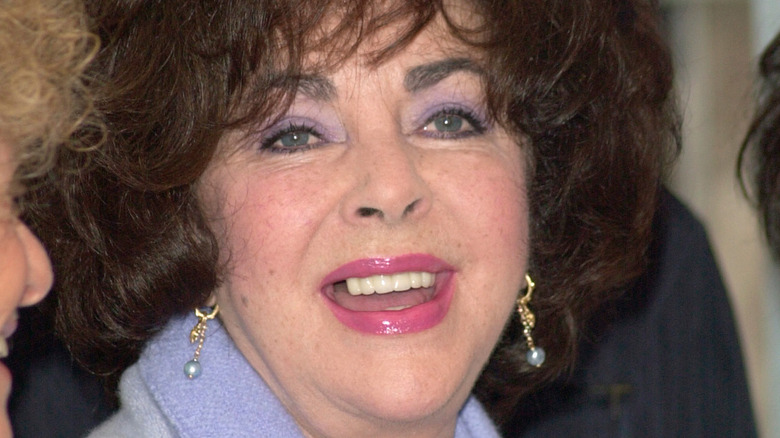Elizabeth Taylor's Heartbreaking Struggles With Addiction
A 2022 authorized biography of Elizabeth Taylor offers new insight into the substance use issues the classic Hollywood actress experienced, especially late in life (per Page Six). The book, "Elizabeth Taylor: The Grit and Glamour of an Icon," was written by Kate Andersen Brower and features, among others who were close to the "National Velvet" star, recollections from Taylor's second son, Christopher Wilding. Prior to Brower's book, Taylor's history of substance use issues was well known. Multiple times in her life, she entered an addiction-related healthcare treatment facility, according to Everyday Health. At the urging of friends and family, Taylor was also among the first A-list Hollywood celebrities to seek help at the now-famous Betty Ford Center in California, as The New York Times reports.
In 1990, three of the "Cleopatra" star's doctors were accused of gross negligence for overprescribing Taylor potentially fatal doses of narcotics from around 1981 through 1990, according to an Associated Press report. As Page Six also notes, some of the most startling and heartbreaking revelations regarding the full scope and scale of Taylor's addiction issues covered in Brower's book come from this time period. One instance in particular relates to Taylor's addiction and her first son, Andrew Wilding. Another has to do with her then daughter-in-law Aileen Getty, at that time Christopher Wilding's wife (via JAQUO Lifestyle Magazine). In those years, concern from those closest to Taylor had grown so severe that Getty sought help from a healthcare regulatory agency.
If you or anyone you know needs help with addiction issues, help is available. Visit the Substance Abuse and Mental Health Services Administration website or contact SAMHSA's National Helpline at 1-800-662-HELP (4357).
She was overprescribed controlled substances
As the 1990 report from the AP explains, three of Elizabeth Taylor's doctors were charged with giving the actress 1,000 prescriptions for 28 controlled substances, including pain relief, sleeping aids, and tranquilizers. In 1983, Taylor admitted her addiction to sleeping pills and painkillers had been going on for more than three decades. According to the South Florida Sun Sentinel, after a bout with the Asiatic flu in the early 1960s, Taylor was admitted to the hospital with staphylococcus pneumonia, likely worsened by her consumption of alcohol and Seconal, a prescription sleep aid. She had struggled with alcohol use from at least the time of her first marriage to actor Richard Burton, who also had highly publicized alcohol use issues, based on a 2020 report from the Daily Mirror.
A 1994 follow-up report from the AP said that three of Taylor's doctors received reprimands and that the pattern of overprescribing Taylor's prescription medication was well documented. At that time, Deputy Attorney General Earl Plowman said (via AP), ″It was a classic case of abuse involving multiple prescriptions, multiple controlled substances at different pharmacies at the same time." According to Brower's book, that investigation was launched because Taylor's then-daughter-in-law Aileen Getty anonymously reported Taylor's healthcare providers to an appropriate oversight agency, as Page Six writes. The degree to which Taylor was overprescribed at that time was such that a medical expert assumed she was dead. Based on her medical records, the dosage of prescription medication she had taken was, in their words, "incompatible with life."
If you or anyone you know needs help with addiction issues, help is available. Visit the Substance Abuse and Mental Health Services Administration website or contact SAMHSA's National Helpline at 1-800-662-HELP (4357).
Taylor asked her son to inject her with Demerol
In Kate Andersen Brower's 2022 biography of Elizabeth Taylor, the actress's second son, Andrew Wilding, also provides a firsthand account of how serious her addiction issues became later in her life. In that section of the book, Wilding recalls a moment when, during a period of time when he was living with his mother in the late 1970s and early 1980s, she summoned him into her bedroom. There, Wilding found his mother with a syringe of Demerol in her hand, a highly-addictive opioid painkiller, according to WebMD. When Wilding refused to give his mother the shot, her son recalled in Brower's book, "She looked at me with deadened yet disappointed eyes, took a breath, steadied her hand, and plunged the needle into her flesh," as Page Six writes.
By 1981, Taylor's addiction issues reached a crisis point, as the star surrounded herself with people who allowed the abuse to continue and doctors who continued to supply her prescription medication, few questions asked. By 1983, Taylor entered a Betty Ford Center, where she stopped drinking but still maintained consuming pills, rationalizing the habit as necessary prescription medication (via Page Six). Taylor's second stint in rehab ended in 1988 when she was asked to leave the center. According to the South Florida Sun Sentinel, Taylor's third husband recalled, "Elizabeth's problems in 1960 were basically the same as they were in 1990. She had become addicted to every pill on the market." Per Biography, Taylor died in 2011 from congestive heart failure at age 79.
If you or anyone you know needs help with addiction issues, help is available. Visit the Substance Abuse and Mental Health Services Administration website or contact SAMHSA's National Helpline at 1-800-662-HELP (4357).


